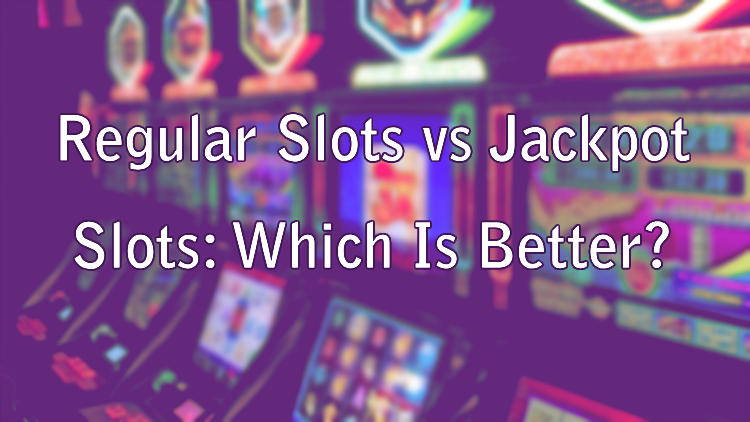
When it comes to online gaming, slots are a popular choice amongst many players.
However, a common debate among players is the choice between regular slots and jackpot slots. Both can offer unique features and potential rewards, but which one offers better value?
Let's delve into the world of online slots and see if we can answer this question!
What's The Difference Between Regular Slots & Jackpot Slots?
Regular slots and jackpot slots might appear similar, but they come with some distinct differences. The primary distinction lies in the potential payouts and the structure of winning these payouts.
Regular slots, also known as non-progressive slots, offer a fixed maximum payout. The prize amount doesn't fluctuate and remains the same, no matter how many times it may be won. This payout is often expressed as a multiplication of the original bet, for instance, 500x, 1,000x, or even up to 50,000x your wager, depending on the game.
On the other hand, jackpot slots come with a progressive feature. The jackpot in these slots is not fixed and continues to grow with each bet placed by players. A small percentage of every wager goes into the jackpot pool, making the potential win astronomical. If won, the jackpot resets to its base amount and starts growing again.
How Do Jackpot Slots Work?
The operation of jackpot slots is quite unique. They function on the principle of pooling a small fraction of each player's bet to create a collective jackpot prize. This prize can then be triggered by any player on any spin, potentially turning a small bet into a huge win!
There are mainly three kinds of jackpot slots – standalone, locally-linked, and network-progressive.
Standalone jackpots are restricted to one slot machine only. Locally-linked jackpots group several games within a single casino. Network-progressive jackpots link games across numerous casinos, creating some of the largest jackpot pools.
What Is Considered a Jackpot On a Slot Machine?
In the context of slot machines, a jackpot refers to the largest prize that a game has to offer. The size of this prize can vary significantly, depending on whether the slot is a regular one or a jackpot slot.
In regular slots, the jackpot is a fixed amount that remains constant, irrespective of the number of times it might be won.
In contrast, in jackpot slots, the prize keeps increasing until it's won. The latter can potentially offer multi-million-pound payouts, making them a highly attractive option for many players.
How Likely Is It To Win On Jackpot Slots?
Winning on regulated jackpot slots is dependent on a multitude of factors. One of the most significant factors is the Random Number Generator (RNG), which ensures fair and random outcomes.
Each spin on a jackpot slot is an independent event, which means that the outcome of one spin does not influence the outcome of the next. This randomness makes it impossible to predict when a jackpot will be won.
However, it's worth noting that the probability of hitting a jackpot is relatively small. Jackpot slots are typically high-volatility games, meaning that they may pay out less frequently than low-volatility slots. However, if they do pay out, the winnings can be substantial.
It's essential to note that the likelihood of winning a jackpot can differ significantly from one game to another.
Some jackpot slots feature smaller, more potentially frequent jackpots. On the flip side, mega-jackpot games may be less forgiving in terms of frequency, but can compensate with massive potential wins if the stars align.
What Triggers The Jackpot On a Slot Machine?
The triggering of jackpots on slots can vary significantly from one slot to another. Some slots might require players to land a specific combination of symbols, while others might award the jackpot randomly.
In some cases, landing a certain number of special symbols can trigger a bonus round where the jackpot can be won. In others, collecting a specific number of symbols or landing a specific symbol in the base game can lead to a potential jackpot win.
It's also worth noting that some slots might require players to place maximum bets to be eligible for the jackpot, while others might allow the jackpot to be won on any bet size.
For more information on a specific slot game you can refer to the paytable and or game rules.
Which Slots Pay Out More?
When it comes to payouts, progressive jackpot slots generally offer bigger potential wins than regular slots. This is because the jackpots in these slots continuously grow with each bet placed by players.
However, it's important to remember that while jackpot slots offer the potential for massive wins, the chances of winning these jackpots are relatively small. On the other hand, regular slots might offer smaller maximum payouts, but these can potentially be won more frequently.
Biggest Slot Machine Jackpot: How High Do They Go?
The size of slot machine jackpots can vary significantly, with some reaching astronomical heights. The largest online slot machine jackpot recorded to date was won on the popular progressive slot game Mega Moolah, with the winner bagging a staggering £19 million!
Are Jackpot Slots Better Than Regular Slots?
Whether jackpot slots are better than regular slots largely depends on the player's preference. If you are chasing massive wins and don't mind the lower odds, then jackpot slots might be the right choice for you.
However, if you prefer potentially more frequent wins, albeit smaller, then regular slots might be the better option. After all, with regular slots, the maximum possible payout is fixed and does not change.
In conclusion, both regular slots and jackpot slots have their unique features and appeal. The choice between the two ultimately comes down to personal preference and the kind of gaming experience you seek.
*All values (Bet Levels, Maximum Wins etc.) mentioned in relation to these slot games are subject to change at any time. Game features mentioned may not be available in some jurisdictions.
